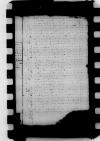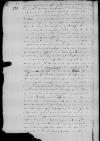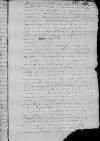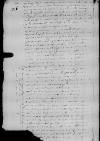Qui me tuis copiosis ⌊⌋ ⌊Viennae⌋ ⌊Austriae⌋ XVIII Augusti ad me datis adeo exhilarasti, ut vix ullae prius gaudium grandius mihi adferre potuerint umquam eoque mihi fuere gratiores, quo prolixiores, ob id maxime, quod te ex Hungarico itinere convaluisse declarabant et fere omnia, quae hac nostra turbulenta tempestate ultro citroque geruntur, abunde significabant desiderio meo in iis satisfacientes, quae iam pridem scire avebam, solverunt enim me de multis fama vulgari incertoque rumore ad me perlatis, in quibus haerebam. Quantum igitur tibi debeam, qui in valetudinis adhuc otio tantum ad me scribendi laborem susceperis, non facile dixerim. Videbar siquidem mihi, quemadmodum ad lunam in ⌊Burgensi civitate⌋ ⌊Hispaniae⌋ noctu plerumque foris stantes solebamus,[1] cum tuas eruditas multaeque prudentiae litteras avide legerem, de totius orbis rebus tecum colloqui, quandoquidem intactum nihil reliquisti earum rerum, quae tum apud tuos ⌊Belgas⌋, tum in regionibus agebantur circumiacentibus, omnesque amicos et socios nostros, qui vel excesserunt, vel adhuc in vivis habentur, graphice mihi depinxisti. Quo factum est, quod legendo iterumque relegendo satiari vix potuerim. Qua de re apud me destinaram ad singula, quantumvis plurima sint, respondere parique tecum vicissitudine in colloquium conced[ere], quod hoc tempore multa ad aulam nostram scriptio non admittit [facere]. Daturus tamen sum operam, si nactus ex publicis et domesticis negotiis otium aliquando fuero et, cum coram non licet, scripto, quod institui, transigam tumque particulatim, in praesenti vero quaedam summatim attingam. Gratum mihi fuit plurimum, quod, ut scribis, reditus in gratiam cum reverendissimo ⌊domino Lundensi⌋ non fuerit necessarius, secutus mite et modestum tuum ingenium cf. Vulg. Prv 16.32 Melior est patiens viro forti et, qui dominatur animo suo, expugnatore urbium ⌊fortior, ut sapiens ait, vir patiens est viro forticf. Vulg. Prv 16.32 Melior est patiens viro forti et, qui dominatur animo suo, expugnatore urbium ⌋, connivendum inter amicos de plerisque interdum expedit. Scripserat et mihi superioribus mensibus de ⌊Isipe⌋ aculeis immo loedoriis plenam epistulam, postulans a me non secus atque ab obnoxio debitore grande quiddam, q[uamquam] ea in parte nulli debeam. Minus autem, quod ab am[ico in] eum non satis amicum modum urgeri par sit, unde to... est negotium, ob id potissimum, quod ultro nullo ... merito a me fuit oblatum, hocque non adm[o]d[u]m ... non sit. Somniat sibi nescio quos aureos montes opera reverendissimi ⌊domini Lundensis⌋ ⌊Gracianus⌋ exporrectus, nihil inventurus. Sic tamen mihi temperavi ad ⌊amicum⌋ rescribens, ne quid ex veteri inter nos comparata coniunctione et consuetudine, modo sic illi placeat, decederet. Talem et eiusmodi in re agere advocatum atque adeo vehementem neque ⌊illius⌋, neque meo statui et personis, quas uterque gerimus, convenit. Non ea est, quae apud ⌊Hispanos⌋, nostri hic ordinis viris de maiorastis etc. cura, quantumque haec nos dedec[et], ut qui ad animarum sollicitudinem astricti sumus, conscientia illorum novit, qui susceptae professioni innituntur. Haec igitur te scire volui, ut si quid ea in re audires, quomodo acta sit, haberes.
De tuis fortunis vitaeque instituto et, quod scribis, quod te totum divinae voluntati submiseris, libenter legi. Illa, quae corpori et animae conducent, disponet omnia. Velim equidem, mi carissime Corneli, te in ⌊Iesu Christi⌋ gratia felicissimum esse et ditissimum. In illa hic nobis nihil umquam deerit nosque post hanc vitam beabit perpetuo. Ad quae hic multi inhiant per fasque nefasque colligunt plurima. cf. Vulg. Ps (G) 38.6.3 et vita mea quasi in conspectu tuo / omnia enim vanitas; Vulg. Ecl 1.2.2 and 12.8.2 vanitas vanitatum omnia vanitas ⌊Nonne omnia vanitascf. Vulg. Ps (G) 38.6.3 et vita mea quasi in conspectu tuo / omnia enim vanitas; Vulg. Ecl 1.2.2 and 12.8.2 vanitas vanitatum omnia vanitas ⌋? Quo fit, quod desiturus numquam sum esse hostis cupiditatis, quem me nosti fuisse semper. Recteque „non thesaurisabit” tua de me pronuntiavit mathesis, licet hoc ⌊amicus ille⌋ non de me sentiat, qui eo mihi obicit avaritiam, quia id, quod a me postulat, in ⌊Hispaniam⌋ non mitto, ubi me nulli vel teruncium debere scio, effecitque, quod etiam hoc, quod ultro dare statueram, iam recusem penitus. Sic fit, cum ex beneficentia, quae gratuito offertur, quasi obaeratum sibi ingratitudo efficere conatur debitum. Sed de iis hactenus.
Velim tecum longior esse in amicorum nostrorum, de quibus scripsisti, recensione et in iis potissimum, quae ad haec nostra turbulenta tempora pertinent, in quibus quivis,
cf. Vulg. Cor1 1:12:5 non quaerit, quae sua sunt ⌊quae sua sunt et non quae Iesu Christi, quaeritcf. Vulg. Cor1 1:12:5 non quaerit, quae sua sunt ⌋, quarum ratione plurima pie revera ac prudent[er] commemorasti, atqui me copia obruit et temporis commoditas deficit. Utinam in iis comitiis, quae diebus istis ⌊Ratisbonae⌋ coire dicuntur, tandem solide aliquid, quo religionis negotium concorditer transigeretur, statui possit. ⌊Ubi⌋ si tecum
illustrissimus
dominus comes ⌊de Buren ⌊Frisiae⌋ gubernator⌋ aderit, de quo adeo prolixe tam multa bona mihi polliceris et quem perinde ac filium diligo, cum ⌊genitorem⌋ eius, virum clarissimum, cui aeternam precor beatitatem, non secus atque patrem, ut nosti, amaverim et veneratus sim, velis illi meo nomine salutem omnemque felicitatem cum ⌊Nestoris⌋ prudentia pariter et aetate precari meamque in se vere paternam ac benevolentissimam propensionem commendare. Licet per tanta ab ⌊eo⌋ intervalla sim dissitus, non tamen mens et voluntas, si quando illius honori et commodis inservire possim, in me vel tepet vel hebes est. Quod item et reliquis nostris bonis dominis et amicis, quorum mihi gratum contexuisti catalogum , persuadere velis, plurimum oro.
De me, cum te pro mutuo nostro amore sollicitum esse sciam, sic accipe. Ego equidem, Deo gratia, recte valeo relictoque aulicae vitae genere, quo suaviter, sed aliquantum non temperanter conviximus, neque me podagra amplius, neque morbi, qui tum se offerebant , infestant, quamvis suos etiam habeat senectus, quae post annum iam quinquagesimum quintum instat et in plerisque cum corpore mores animi velut in novum et gravius institutum commutavit. Non tamen (
cf. Verg. A. 6.743 ⌊quisque suos patimur manescf. Verg. A. 6.743 ⌋) a molestiis sum immunis, quas partim publicae et domesticae curae, partim non boni homines, ob id, quod ex Dei gratia sum, mihi invidentes immerenti inferunt. Eas tamen, licet nonnumquam onerosae sint,
cf. Ov. Fast. 4.11 Conscia mens recti famae mendacia risit ⌊cons[cia] mens recti ridetcf. Ov. Fast. 4.11 Conscia mens recti famae mendacia risit ⌋ suoque nixa candore et integritate fert levissime. In hocque, quantum possum, incumbo studiosius, ut dissui cum aula inita coniunctio possit, ut illam mei perpetua capiat oblivio, eo quod, quicquid aetatis reliquum est, in divinarum litterarum contemplatione absumere penitus apud me destinaverim. Hoc ut per Dei misericordiam possim assequi, orare non desino.
Quae hic et in viciniis aguntur, habe paucis. Serenissimus ⌊rex meus⌋ cum ⌊filio⌋ et ⌊regina⌋, de qua nostrates carmen ⌊Iob⌋ canunt „cf. Vulg. Iob 2.10 Si bona suscepimus de manu Domini ⌊Si Bonam suscepimuscf. Vulg. Iob 2.10 Si bona suscepimus de manu Domini ⌋” etc., sunt in ⌊Lituania⌋ confectisque vel pace, vel certis indutiis cum ⌊Moscis⌋, cum iam cum ⌊Tartaris⌋ fere absoluta sunt omnia, in ⌊regnum⌋ ad veris auram parabunt reditum. Fit iterum magna mortuo ⌊archiepiscopo Gneznensi⌋ apud nos mutatio, in cuius [locum] ⌊episcopus Cracoviensis⌋ succedit, vir alioqui aulice bonus, ver[um cui pietatis] admodum parum inest. Quis ⌊illi⌋ succedet et vicissim ... (auctionaria enim res est), nondum liquet h[actenus]. ... qui digniores sunt Christianaeque inhaerent pietati, hastam attingere verentur.
Cum ⌊vicino meo duce⌋, hic cum quo ab omni fere parte fines habeo, pulchre mihi convenit rebus in omnibus, praeterquam in iis, quae ad religionem pertinent, in quibus cum aliud nequeam, cf. Vulg. Rm 14:5 Unusquisque in suo sensu abundet ⌊in suo illum sensu abundarecf. Vulg. Rm 14:5 Unusquisque in suo sensu abundet ⌋ permitto. Meis vero nihil aliud licet, quam, quod pio usu in ecclesia nostra a tanto tempore, quo haec nostra fides hic propagata est, receptum esse, ab omnibus agnoscitur. Vicini s[ec]ta hac insana infecti male sibi a ⌊comitiis imperii⌋ metuunt. ⌊Quae⌋ utinam, quemadmodum optamus, ut tandem hoc periculosum in religione dissidium sine caede et sanguine componi possit, succed...an[t] auspice Christianissimo ⌊caesare⌋ nostro, quem ut dominus Deus in hoc confirm[et] instituto caelestique gratia ac sapientia fecundet, intime oro. Neque cur fore non sperem iis coeptis felicem exitum, quandoquidem
cf. Vulg. Ps (G) 91.13.1 iustus ut palma florebit, ut cedrus Libani multiplicabitur ⌊iustus floret ut palmacf. Vulg. Ps (G) 91.13.1 iustus ut palma florebit, ut cedrus Libani multiplicabitur ⌋ mittiturque illi auxilium ab alto, cf. Vulg. Ps (G) 84.14.1 iustitia ante eum ambulabit et ponet in via gressus suos ⌊iustiti[a] ante illum ambulat et disponit in via gressus eiuscf. Vulg. Ps (G) 84.14.1 iustitia ante eum ambulabit et ponet in via gressus suos ⌋, cf. Vulg. Ps (G) 111.6.1 quia in aeternum non commovebitur in memoria aeterna erit iustus ab auditione mala non timebit; Vulg. Ps (G) 124.1.3 non commovebitur in aeternum qui habitat in Hierusalem ⌊quia in aeter[num]
non commovebiturcf. Vulg. Ps (G) 111.6.1 quia in aeternum non commovebitur in memoria aeterna erit iustus ab auditione mala non timebit; Vulg. Ps (G) 124.1.3 non commovebitur in aeternum qui habitat in Hierusalem ⌋, verum cf. Vulg. Ps (G) 1.4.1-2 non sic impii non sic sed tamquam pulvis quem proicit ventus a facie terrae ⌊non sic
impii, non sic, sed erunt tamquam pulvis, quem proicit ventus a facie terraecf. Vulg. Ps (G) 1.4.1-2 non sic impii non sic sed tamquam pulvis quem proicit ventus a facie terrae ⌋. Quod si tibi istae in ipsis ⌊comitiis⌋ reddentur, ne grave tibi sit, quaeso, vel per ⌊Adolphum⌋ nostrum nasi Hamburgensis, cui et ob id ⌊⌋, quae inibi tractabuntur et statuentur, ad me, quantum potest fieri copiosius (plurimum enim tua illa dulcis et erudita copia me oblectat), perscribere cum primis. In eo meum in te accensum amorem imflammabis et, quamvis tibi forsan aliis in rebus usui esse nequeam, non tamen fastidio tibi sit amor meus, quo in omnium rerum eventa(!) fidere et frui potes tutissime.
Ceterum nunc ad alias scriptiones avocor ac aegre a te avellor, mi carissime Corneli, calamo quidem, non autem animo, qui adeo tibi fixus inhaeret, ut neque hic, neque in futura aeternitate sine te esse velit. A quibus tu mihi adscripsisti salutem, illis eandem et longe salubriorem, ut meo nomine dicas, oro, iis praesertim, ⌊⌋, imprimis vero honestissimae ⌊tuae coniugi⌋ et ⌊liberis⌋, ⌊decanoque nostro Brugensi⌋, commendabisque me diligenter
illustrissimis
dominis commendatori ⌊m[a]iori Couos⌋ et ⌊Granvellae⌋, petens ab eis, ut me aliquando serenissmae ⌊caesareae et catholicae maiestati⌋, cui, si qua in re possem, libenter inservirem, stu[dio]sissime commendent. Quod ut tu pariter nactus occasionem facias, maiorem abs te in modum rogo. Fratres mei ⌊Bernardus⌋, [qui] huius est castri, ut vocant, capitaneus, et ⌊Georgius⌋, qui castri n[ostri ⌊Ressel⌋] ...ime
et duae hic mecum ⌊sorores viduae⌋, ⌊tertia⌋ est cum ⌊marito⌋ ... [capita]neo ⌊castri
Seburg⌋ longissimo tibi tempore salutem duraturam optant ex animo. Vale diutissime, ..., mi carissime atque iterum carissime Corne[li] ....



